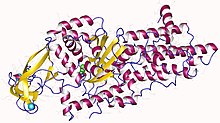Méthionyl-ARNt synthétase
Apparence
Méthionine-ARNt synthétase
| N° EC | EC |
|---|---|
| N° CAS |
| IUBMB | Entrée IUBMB |
|---|---|
| IntEnz | Vue IntEnz |
| BRENDA | Entrée BRENDA |
| KEGG | Entrée KEGG |
| MetaCyc | Voie métabolique |
| PRIAM | Profil |
| PDB | RCSB PDB PDBe PDBj PDBsum |
| GO | AmiGO / EGO |
La méthionyl-ARNt synthétase, ou MetRS, est une ligase qui catalyse la réaction :
- ATP + L-méthionine + ARNtMet AMP + pyrophosphate + L-méthionyl-ARNtMet.
Cette enzyme assure la fixation de la méthionine, l'un des 22 acides aminés protéinogènes, sur son ARN de transfert, noté ARNtMet, pour former l'aminoacyl-ARNt correspondant, ici la méthionyl-ARNtMet.
Il existe deux types de MetRS, MetRS1 et MetRS2, classés selon leur homologie de séquence et de structure. MetRS1 se trouve chez les bactéries à Gram positif, les parasites protozoaires et les mitochondries. Alors que MetRS2 est principalement retrouvée chez les eukaryotes, les archées et les bactéries à Gram négatif[1].
Notes et références
[modifier | modifier le code]- (en) Yi, J., Cai, Z., Qiu, H., Lu, F., Luo, Z., Chen, B., Gu, Q., Xu, J. and Zhou, H., « Fragment screening and structural analyses highlight the ATP-assisted ligand binding for inhibitor discovery against type 1 methionyl-tRNA synthetase », Nucleic Acids Research, vol. 50, no 8, , p. 4755-4768 (DOI 10.1093/nar/gkac285).
- (en) Bergmann FH, Berg P and Dieckmann M, Paul Berg et M. Dieckmann, « The Enzymic Synthesis of Amino Acyl Derivatives of Ribonucleic Acid », Journal of Biological Chemistry, vol. 236, no 6, , p. 1735–1740 (DOI 10.1016/S0021-9258(19)63294-1, lire en ligne, consulté le )
- (en) Lee CP, Dyson MR, Mandal N, Varshney U, Bahramian B, RajBhandary UL, M R Dyson, N Mandal et U Varshney, « Striking effects of coupling mutations in the acceptor stem on recognition of tRNAs by Escherichia coli Met-tRNA synthetase and Met-tRNA transformylase. », Proceedings of the National Academy of Sciences, vol. 89, no 19, , p. 9262–9266 (ISSN 0027-8424 et 1091-6490, PMID 1409632, PMCID PMC50106, DOI 10.1073/pnas.89.19.9262, lire en ligne, consulté le )


